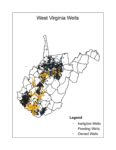As we think more about it and have more experience in August, 2025, we have additional advice for mineral owners (and those who own both surface and minerals but are dealing with their minerals). This information applies if the company is offering you a new gas (and oil and liquids) lease. It also applies if there is an old gas or oil lease on your land and the company needs to get an amendment to the lease that they want you to sign because the old lease does not have a pooling/unitization clause. They need one of those clauses because it allows them to drill horizontal well bores through multiple mineral tracts — and that is about the only way wells are drilled now.
Does the top the first page of the document they want you to sign say “lease” or “amendment”. If it is an amendment they want, unless you know for sure that there is an old well on the acreage covered by the old lease and that it is currently producing, then the first thing you want to do is make sure that the old lease is still “held by production” or “held by storage”. You may need professional help with that. But it will be worth it because royalty payments are generally higher in new leases than in amendments to old leases.
Background: We have seen leases offering to drill for gas (and it’s for OUR gas mind you) with royalties from 12.5% to 18%. And when companies sell leases to each other, the royalties the eventual actual driller has to pay out usually total 20% (including the royalty due to the lessor/mineral owners in the original lessor/mineral owner’s lease, plus an”overriding royalty” that the original lessee/company that first “owns” the lease gets for selling/assigning the lease to the actual driller). So think about it. The driller gets to keep 80% of the money for which they sell OUR gas. West Virginians need to think like rich Texans and rich drilling companies, not classic West Virginians. Things should sell for what they are worth to the buyer and not the seller.
Surface use: This article will deal mostly with the gas (including oil and liquids) royalty terms of leases. One horizontal well produces 60 times the gas as an old conventional vertical gas well, and they put six or eight or more horizontal wells on one pad. So we do not get as much call for advice on separate surface use agreements or surface use provisions in leases. Our advice for surface use has not changed since we won the EQT vs Crowder case. Links on that page will lead you to whole other pages on what you should be sure to insist on in leases if you own the surface and they want to use you for a well pad or something else. So in this article we only advise you to insist on a “no surface use” provision in a lease/amendment or its addendum. Before you allow the use of your surface you should dive deeply into what protections you should have if they drill on your land. Otherwise we reiterate that if you want to agree to be paid for using your land for a well pad, you should be paid what use of your land is worth to them (hundreds of thousands of dollars), and not what it is worth to you.
Now back to gas (and oil and liquids) lease or amendment royalty negotiations.
First, do not buy their arguments that if you do not sign, or do not sign on their terms, they will drill elsewhere and you will get no royalties at all. Trust us on this. Drillers drill where their petroleum and reservoir geologists tell them where there are most and richest deposits of gas, oil and liquids (and their existing infrastructure). If the driller gets to keep 80+% of the gas, and their geologist or reservoir engineer tells them they can get only 1% more gas drilling where your land is as opposed to somewhere else, then the driller can well afford to give you another percent or two (or three or four) of royalty.
Second, do not agree to a smaller royalty just because they say they are drilling where the formation is thinner or less rich. (Check it out with the West Virginia Geological and Economic Survey to see if they are telling the truth, at least about thickness.) Yes that may mean that they will not have as much gas to sell from a well (or unit). But since your royalty is a percentage of what they sell, that already means that you will already be getting a smaller amount than if they drill elsewhere, because your percentage is a percentage of a smaller amount. If your royalty check is already going to be smaller because they are selling less, you are losing twice if your royalty percentage is also smaller. Maybe your signing bonus should be less if the producing formation under you is thinner, but not the royalty.
Third, we are seeing at least one big company, and maybe some others, that are being less and less flexible on their royalty and other terms. In the past, when companies said that their offer was only good for 10 days, we found that after 10 days the offer usually went up! But some companies are holding very firm now. They may be threatening to use “cotenancy” or “force pool” you. We say “Good”. It is probably a good idea to let them force pool you. We have a whole web page on forced pooling (and related “co-tenancy”). IF they force pool you or use cotenancy, then you will get the highest royalty paid to any other mineral owner in the unit; there will be no deductions fro your stated royalty percentage; and you will avoid having to agree to all the overreaching language in their long, multi-page leases. True you will only get the average signing bonus in forced pooling, but lots more money comes from better royalties than from better signing bonuses.
Finally: The financial terms of leases, royalties and signing bonuses, are what are easiest to understand and seem most important to most people. But these leases have pages and pages of fine print. When you buy a house or a car and sign papers, lots and lots of the terms in those papers are required by consumer protection laws. But in an oil and gas lease, every single one of the provisions in the lease is drafted by the driller’s lawyers, and most are not very good for you. One example is an “arbitration clause” that will eliminate you from being in a class action if the company gyps its royalty recipients on the amount of money they get. Another one, and we are not making this up, is a “general warranty” provisoin that says if the driller gets sued because it did the title search wrong, you will pay for the driller’s defense lawyer. So if you want to sign your own lease as opposed to allowing the lease to be done by forced pooling or cotenancy, we strongly advise you to contact your own lawyer, and we have some on one of our pages. There are lots of other legal language that needs negotiated besides the financial terms.
Now: Go back to our leasing web page and click on other links that might apply to your situation. Maybe start with our “Top 6 Pieces of Advice Before Signing a Gas Lease.”









